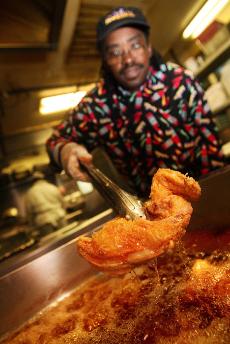New Yorkers embrace city’s ban on artificial trans fats in restaurants

Dec 6, 2006
Last updated on May 12, 2016 at 06:46 a.m.
NEW YORK – New York on Tuesday became the first city in the nation to ban artery-clogging, artificial trans fats at restaurants, leading the charge to limit consumption of an ingredient linked to heart disease and used in everything from french fries to pizza to pancake mix.
In a city where eating out is a major activity – either for fun or out of hectic necessity – many New Yorkers were for the ban, saying health concerns were more important than fears of Big Brother monitoring them.
“I don’t care about what might be politically correct and what’s not,” said Murray Bader, nursing a cup of coffee at Dunkin’ Donuts on Tuesday morning. “I want to live longer!”
The 72-year-old Manhattan resident called the ban a “wake-up call” for a public often unaware of the risks of artificial fats. “This stuff clogs up your vessels,” he said. “When it comes to health, we only have one life.”
Get The Daily Illini in your inbox!
Toni Lewis, catching a quick dinner at McDonald’s before her daughter’s piano lesson on the eve of the vote, acknowledged that it might be intrusive for the city to tell people what they can and can’t put into their stomachs. But, she added, it was welcome.
“This is New York,” she said. “People eat out a lot. We don’t have a choice. We need someone to make it a healthier proposition.”
Nutrition groups say artificial trans fats clearly contribute to heart disease. Studies have shown they raise bad cholesterol and lower the good kind. Partially hydrogenated vegetable oil, the main form of artificial trans fats, is used for frying and baking and turns up in processed foods like cookies, crackers and pancake mix.
“It’s basically a slow form of poison,” said David Katz, director of the Yale Prevention Research Center. “I applaud New York City, and frankly, I think there should be a nationwide ban.”
Not everyone agrees with Katz – he’s received angry e-mails calling him the “food police” and saying, “If I want to eat trans fats, that’s my inalienable right.” To which he responds: “Would you want the burden of asking your restaurant whether there’s lead in the food? Whether there’s arsenic in the bread? For all I know, maybe arsenic makes bread more crusty. But it’s poison.”
Some industry members were not happy. E. Charles Hunt, executive vice president of the New York State Restaurant Association, said the city had overstepped authority by forbidding restaurants to use an FDA-permitted ingredient.





